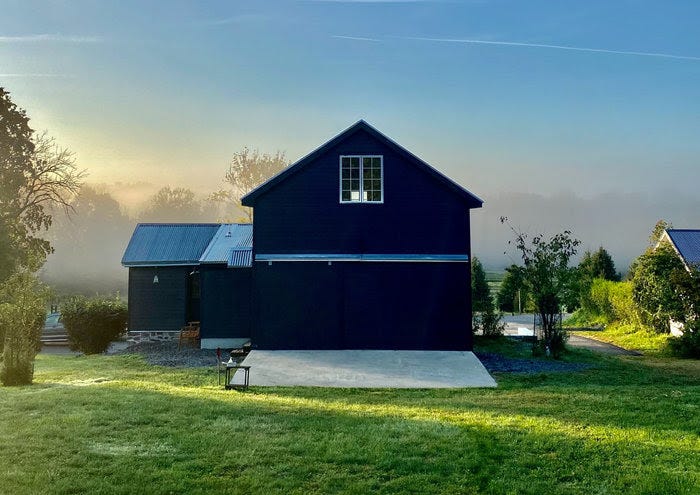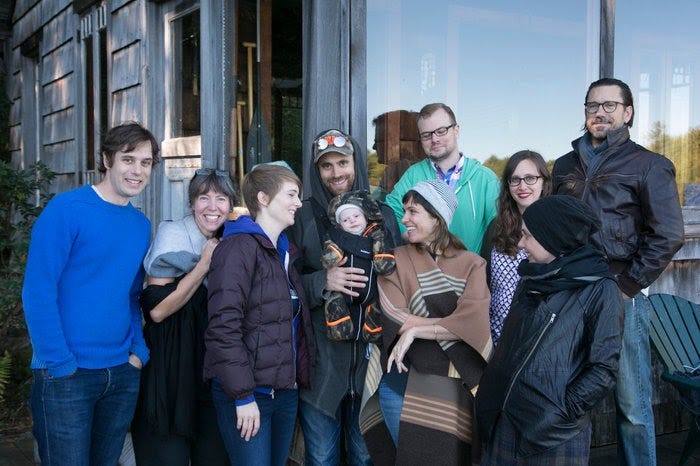Starting one thing, ending another
Because I can't do it all (and you probably can't, either).
On Sunday evening, I returned from a joy-filled and inspiring week in New Mexico where I ran my second annual writing workshop, Turning Points. We learned, we laughed, we roped, we cold plunged, we ate handmade tortillas and heritage pork and grain dishes all week.
And then on Monday, I woke up and did something unexpected. I shuttered the nonprofit artists retreat, The Cabins, that I founded in 2016.
This decision might have been unexpected to the participants, fans and donors who have been supporting our organization since 2016, but it wasn’t unexpected to our board. We began discussing potential dissolution a year and a half ago, but we dragged our feet because nobody wanted the beautiful things we’d put into motion at The Cabins to come to an end. The problem? Nobody on our board—me, in particular—had the resources (both financial and energetic) to keep a nonprofitable nonprofit going in this grueling economy and political landscape where being an artist is a daily act of survival.
“Sadly, the same news is coming from so many incredible arts nonprofits in my life right now,” wrote filmmaker Hannah Meyers, whose work we supported in 2022, when she learned of our decision. “The challenges are so complex.”
The challenges of running a nonprofit are, indeed, complex, but the vision and inspiration that motivated me to start The Cabins are not complex at all.
For a long time before I launched The Cabins, I was longing for a community where artists could leave their silos and learn from one another. In my twenties, I attended writing conferences and workshops that were filled with only writers, and then accompanied my filmmaker husband (we wrote films together at the time) to film festivals where I only dialogued with people in the film business. When I went to art openings, it was people in the art world. Dance festivals? Dancers and the benefactors who supported dance. What if there was a place where creatives gathered to share skillsets from their disciplines that could benefit everyone present, was a question I kept asking. Not a place like McDowell or Yaddo where creatives work intensely on individual projects in isolated cabins, but a place where artists came together to learn cooperatively in the woods?
I couldn’t find such a place, so I decided to create it. I founded The Cabins in 2016 to push artists of all backgrounds out of their silos into a communal frame of mind. Filmmakers joined writers who joined actors and sculptors and clowns alongside musicians and playwrights to create four days of magic in cabins by a lake.
We offered group retreats twice a year in the winter and summer in northwestern Connecticut up until the pandemic when restrictions on in-person gatherings inspired us to pair deserving artists with vacant and/or supplemental homes in scenic places around the country to work from in peace and safety. From the boulder gardens of Joshua Tree to the verdant bogs of Lincoln, Massachusetts, the desert air of Truth and Consequences, New Mexico to the snowy mountains of the Catskills, we gave dozens of artists (and cohorts, when it was safe to do so) rooms of their own to create art and deeply rest.


In the ensuing years, we set writer Carmen Maria Machado up with a residency in Lambertville, New Jersey, sent comic book writer Booki Vivat to a cabin in Yuba County, California, welcomed writer Brian Lin to Joshua Tree, enjoyed movement classes from master clown Gardiner Comfort, learned how pasta-making imitates world-making in a class from Marie-Helene Bertino, learned how to storyboard via artist and filmmaker Z. Behl, and too many other highlights to list. Here is a picture of our cherished inaugural group from 2016 in a lakeside cabin during winter:

We applied for 501(c)3 status in 2019 with a board nearly completely composed of people who had come through The Cabins as artists themselves, a fact that we were proud of that led us to win a good deal of the grants we eventually applied to.
But holy shit—grant cycles? Fundraising? Trying to keep money in the kitty so that our artists could attend our group retreats for free? The first grant cycle I survived proved something I suspected—I have a nonprofit mindset and nonprofit values, but I don’t have the inexhaustible fundraising drive that executive directors of nonprofits need. It’s not that I don’t have the contacts or the skills to do it—as with most endeavors, fundraising became a question of emotional bandwidth, financial constraints, and time. It’s nearly impossible (or at least it was for me) to run a nonprofit as a side project. The paperwork, the grant cycles, the board meetings, the minutes that have to be filed with the state, the emails, the emails, the excel sheets, the Zoom meetings, the logistics, the follow ups with hosts and attending artists, sourcing four days of meals on a tight budget, the financial reports, the spam from people who thought we ran an Airbnb…and all this for the love of what we were doing because (with the exception of our grant writer) our team did not have salaries.
As I entered my forties, and became ever busier with my competing identities of “writer” and “mother,” the identity of “unpaid nonprofit director” became a heavy load to bear. If I had been independently wealthy or had a patron with inexhaustible pockets at my behest, I think we could have made it. But our board was made of working artists, most of them overstretched parents like myself. Each year, rising costs made it harder to run a successful arts-based nonprofit in a sensitive, meaningful and impactful manner and raising funds has become more difficult as our board of working artists had—rightly—to put their own work first. We never intended to make our nonprofit profitable, but swimming against the stream of capitalism and right wing politics is downright exhausting. And you know what? I think it’s an act of resistance to announce that you are tired. I think it’s an act of care to leave the party while it’s still bright and good. We had nearly a hundred artists go through our programming to emerge more confident, focused, and connected than they’d been when they applied, and that is something to be proud of. Our board worked together as a team through the challenges of the pandemic and learned how to pivot and be flexible in complicated situations, and that’s something to be proud of, too. I learned a lot about my instincts to support creative people and the limits I have to follow through on that support, and that’s an essential lesson to have learned as I continue as a self-employed educator in 2025 and beyond.
The letter I sent yesterday to The Cabins email list was not so much a goodbye as a confession that none of us—creatives, especially—can do "all the things" and that it is acceptable and laudatory to unplug to replug, and/or offload a burden that we can’t carry without breaking, even if the burden is beautiful and good.
The spirit of arts activism and emotional support that I poured into The Cabins has a new outlet here via my Substack and in my Turning Points classes and retreats. And my family is benefitting more from my altruism now that I don’t have to do nonprofit work after my regular workday.
It was heartbreaking to file our dissolution with the state of Connecticut, heartbreaking to let our donors and artists know that we are closing shop. I don’t like that we had to make this decision, but I remain proud of this decision nonetheless. As I get older, I understand more fully how “doing all the things” is a myth, and a myth born out of patriarchy. I no longer want to be frantic and overcommitted to the point that I have to do things half-assed or in a haphazard manner. We didn’t get to the haphazard/half-assed point with The Cabins, but we would have if we’d continued. I’m glad we chose not to.
If you’re reading this and supported or attended The Cabins, thank you. Thank you from my heart. It was an honor to have your creativity and generosity with us while we flew.
Thank you for listening to (or reading) my confession. In the comments, if you feel comfortable, maybe you want to share about something that you are tempted to let go of, or something that you released? Maybe it’s a book project, maybe it’s a person, maybe—like me—it’s a 501(c) 3.
Whatever it is or isn’t, I wish you ease in the coming weeks (probably only manageable if you disconnect your WiFi given the storm we’re headed into?).
Thank you for continuing to be here with me,
Courtney





Proud of you Courtney for knowing when to pull the plug on something—especially when it’s so meaningful. But what’s more impressive is you’re ending it very intentionally and BEFORE it ends you through burnout! Hanging on to the work we love, but isn’t serving us anymore is a hard habit to break. My congratulations to you for being wise enough to choose you.
As it’s an ending it made me think of a note my friend @dina bell laroche just posted about ceremonies and rituals. For beginnings and endings. I don’t know how to link to it, but if I can figure it out I will. A small ceremony to honour your work and that of the others may be in order. 🩷🤍🩷
Courtney, I never have managed to attend any of your retreats, but I have appreciated them from afar on behalf of other artists who have. I agree with Kim, here, who says how impressive it is that you did something meaningful for so many people, then bowed out intentionally before burnout and resentment ate at your soul. Time is the most precious commodity any artist has, and however we might want to help others, we must guard enough time for our own work or the world will no longer have any artists, since nobody else is about to guard our time for us. Having the time and energy to contemplate and create is the only way we can keep putting beauty and meaning into the world.